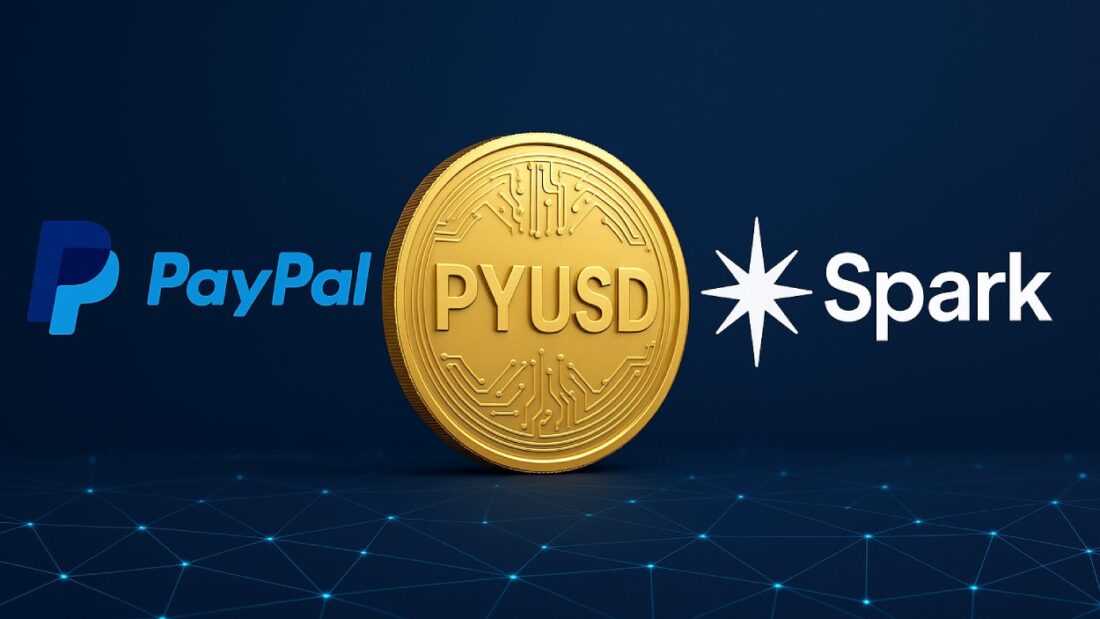PayPal has joined forces with DeFi platform Spark to scale the liquidity of its PYUSD stablecoin, targeting a $1 billion injection through onchain lending protocols.
Key Takeaways
- PayPal partnered with Spark to increase PYUSD stablecoin liquidity to $1 billion using Spark’s DeFi infrastructure.
- SparkLend has already accumulated up to $200 million in PYUSD deposits, with growth expected in the coming weeks.
- Spark’s $8 billion reserve pool is being deployed to offer predictable and cost-efficient stablecoin liquidity.
- The move signals PayPal’s deepening role in decentralized finance, amid surging stablecoin adoption and clearer crypto regulations.
What Happened?
PayPal has launched a major liquidity initiative for its U.S. dollar-pegged stablecoin, PYUSD, by partnering with the decentralized finance platform Spark. The collaboration leverages Spark’s lending protocol, SparkLend, and an $8 billion reserve to support scalable, cost-efficient liquidity that aims to replace traditional market-maker incentives.
Spark joins forces with @PayPal to grow PYUSD supply by $1 billion within the coming weeks.
— Spark (@sparkdotfi) September 25, 2025
Having already reached 200m deposits, this milestone reflects both the demand for PYUSD and the effectiveness of Spark’s stablecoin bootstrapping framework. pic.twitter.com/kNri70hRGv
PYUSD Gains Traction With DeFi Liquidity Boost
The partnership aims to scale PYUSD’s liquidity from its current $200 million to $1 billion in the coming weeks. Spark’s Liquidity Layer is the engine behind this effort, channeling reserves into lending pools where users can supply or borrow PYUSD directly.
Unlike traditional methods that rely on expensive third-party market makers with costs in the “low double digits,” Spark’s model offers capital at significantly lower borrowing rates of around 7 to 8 percent, according to Sam MacPherson, co-founder of Spark contributor Phoenix Labs.
“Predictable access to deep liquidity is what allows stablecoins like PYUSD to scale quickly,” MacPherson said, calling it a blueprint for fintech adoption of stablecoins through DeFi rails.
A New Blueprint for Stablecoin Growth
PYUSD was recently listed on SparkLend after completing a risk assessment, opening the door for liquidity provisioning through Spark’s Liquidity Layer. MacPherson revealed the platform is currently swapping tens of millions of USDC for PYUSD daily, helping ensure constant depth for borrowing and lending activity.
Spark’s model represents a new bootstrapping blueprint for stablecoins, providing sustainable and compliant onchain liquidity at scale. By tapping into blue-chip collateral-backed capital, the partnership promises both efficiency and safety.
This system is already operating at fintech scale. Spark previously deployed $630 million in Bitcoin-backed loans to Coinbase, demonstrating its capacity to serve institutional partners.
PayPal’s DeFi Strategy Comes Into Focus
David Weber, Head of the PYUSD Ecosystem at PayPal, emphasized the importance of Spark’s infrastructure in enabling the company’s vision for digital currency:
The stablecoin sector is experiencing a strong resurgence, with global supply rising by over $30 billion in just three months, reaching a record high of $295 billion. Daily stablecoin transaction volumes frequently top $100 billion, reflecting growing utility and adoption.
Why It Matters Now?
The timing of this partnership aligns with broader momentum in crypto adoption and more defined regulatory frameworks. MacPherson pointed to these developments as the reason why more traditional fintechs like PayPal are entering DeFi:
As PayPal’s PYUSD becomes more deeply integrated into DeFi ecosystems through Spark, the partnership sets a precedent for how traditional finance and decentralized finance can cooperate to scale stablecoin usage effectively.
CoinLaw’s Takeaway
In my experience, this is one of the clearest signs yet that mainstream fintech is going all-in on DeFi infrastructure. PayPal is not just experimenting with crypto anymore. It is actively engineering the foundation for PYUSD to play a serious role in onchain finance. Spark’s model is smart. It skips the old, expensive route of incentivizing market makers and instead uses massive reserves to create immediate, low-cost liquidity. I found the partnership’s structure to be practical, scalable, and regulatory-friendly, which is exactly what the space needs right now.


































































